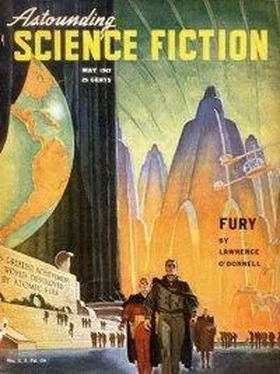Thomas Sherred - E for Effort
Здесь есть возможность читать онлайн «Thomas Sherred - E for Effort» весь текст электронной книги совершенно бесплатно (целиком полную версию без сокращений). В некоторых случаях можно слушать аудио, скачать через торрент в формате fb2 и присутствует краткое содержание. Год выпуска: 1947, Издательство: Street & Smith Publications, Inc., Жанр: Фантастика и фэнтези, на английском языке. Описание произведения, (предисловие) а так же отзывы посетителей доступны на портале библиотеки ЛибКат.
- Название:E for Effort
- Автор:
- Издательство:Street & Smith Publications, Inc.
- Жанр:
- Год:1947
- ISBN:нет данных
- Рейтинг книги:3 / 5. Голосов: 1
-
Избранное:Добавить в избранное
- Отзывы:
-
Ваша оценка:
- 60
- 1
- 2
- 3
- 4
- 5
E for Effort: краткое содержание, описание и аннотация
Предлагаем к чтению аннотацию, описание, краткое содержание или предисловие (зависит от того, что написал сам автор книги «E for Effort»). Если вы не нашли необходимую информацию о книге — напишите в комментариях, мы постараемся отыскать её.
E for Effort — читать онлайн бесплатно полную книгу (весь текст) целиком
Ниже представлен текст книги, разбитый по страницам. Система сохранения места последней прочитанной страницы, позволяет с удобством читать онлайн бесплатно книгу «E for Effort», без необходимости каждый раз заново искать на чём Вы остановились. Поставьте закладку, и сможете в любой момент перейти на страницу, на которой закончили чтение.
Интервал:
Закладка:
You can’t live, or work, with a likable person without admiring some of the qualities that make that person likable. Another thing; it’s a lot easier to worry about the woes of the world when you haven’t any yourself. It’s a lot easier to have a conscience when you can afford it. When I donned the rose-colored glasses half my battle was won; when I realized how grand a world this could be, the battle was over. That was about the time of “Flame Over France,” I think. The actual time isn’t important. What is important is that, from that time on, we became the tightest team possible. Since then the only thing we’ve differed on would be the time to knock off for a sandwich. Most of our leisure time, what we had of it, has been spent in locking up for the night, rolling out the portable bar, opening just enough beer to feel good, and relaxing. Maybe, after one or two, we might diddle the dials of the machine, and go rambling.
Together we’ve been everywhere and seen anything. It might be a good night to check up on Francois Villon, the faker, or maybe we might chase around with Haroun-el-Rashid. (If there was ever a man born a few hundred years too soon, it was that careless caliph.) Or if we were in a bad or discouraged mood we might follow the Thirty Years’ War for a while, or if we were real raffish we might inspect the dressing rooms at Radio City. For Mike the crackup of Atlantis has always had an odd fascination, probably because he’s afraid that man will do it again, now that he’s rediscovered nuclear energy. And if I doze off he’s quite apt to go back to the very Beginning, back to the start of the world as we know it now. (It wouldn’t do any good to tell you what went before that.)
When I stop to think, it’s probably just as well that neither of us married. We, of course, have hopes for the future, but at present we’re both tired of the whole human race; tired of greedy faces and hands. With a world that puts a premium on wealth and power and strength, it’s no wonder what decency there is stems from fear of what’s here now, or fear of what’s hereafter. We’ve seen so much of the hidden actions of the world—call it snooping, if you like—that we’ve learned to disregard the surface indications of kindness and good. Only once did Mike and I ever look into the private life of someone we knew and liked and respected. Once was enough. From that day on we made it a point to take people as they seemed. Let’s get away from that.
The next two pictures we released in rapid succession; the first, “Freedom for Americans,” the American Revolution, and “The Brothers and the Guns,” the American Civil War. Bang! Every third politician, a lot of so-called “educators,” and all the professional patriots started after our scalps. Every single chapter of the DAR, the Sons of Union Veterans, and the Daughters of the Confederacy pounded their collective heads against the wall. The South went frantic; every state in the Deep South and one state on the border flatly banned both pictures, the second because it was truthful, and the first because censorship is a contagious disease. They stayed banned until the professional politicians got wise. The bans were revoked, and the choke-collar and string-tie brigade pointed to both pictures as horrible examples of what some people actually believed and thought, and felt pleased that someone had given them an opportunity to roll out the barrel and beat the drums that sound sectional and racial hatred.
New England was tempted to stand on its dignity, but couldn’t stand the strain. North of New York both pictures were banned. In New York state the rural representatives voted en bloc, and the ban was clamped on statewide. Special trains ran to Delaware, where the corporations were too busy to pass another law. Libel suits flew like spaghetti, and although the extras blared the filing of each new suit, very few knew that we lost not one. Although we had to appeal almost every suit to higher courts, and in some cases request a change of venue which was seldom granted, the documentary proof furnished by the record cleared us once we got to a judge, or series of judges, with no fences to mend.
It was a mighty rasp we drew over wounded ancestral pride. We had shown that not all the mighty had haloes of purest gold, that not all the Redcoats were strutting bullies—nor angels, and the British Empire, except South Africa, refused entry to both pictures and made violent passes at the State Department. The spectacle of Southern and New England congressmen approving the efforts of a foreign ambassador to suppress free speech drew hilarious hosannas from certain quarters. H. L. Mencken gloated in the clover, doing loud nip-ups, and the newspapers hung on the triple-horned dilemma of anti-foreign, pro-patriotic, and quasi-logical criticism. In Detroit the Ku Klux Klan fired an anemic cross on our doorstep, and the Friendly Sons of St. Patrick, the NAACP, and the WCTU passed flattering resolutions. We forwarded the most vicious and obscene letters—together with a few names and addresses that hadn’t been originally signed—to our lawyers and the Post Office Department. There were no convictions south of Illinois.
Johnson and his boys made hay. Johnson had pyramided his bets into an international distributing organization, and pushed Marrs into hiring every top press agent either side of the Rockies. What a job they did! In no time at all there were two definite schools of thought that overflowed into the public letter boxes. One school held that we had no business raking up old mud to throw, that such things were better left forgotten and forgiven, that nothing wrong had ever happened, and if it had, we were liars anyway. The other school reasoned more to our liking. Softly and slowly at first, then with a triumphant shout, this fact began to emerge; such things had actually happened, and could happen again, were possibly happening even now; had happened because twisted truth had too long left its imprint on international, sectional, and racial feelings. It pleased us when many began to agree, with us, that it is important to forget the past, but that it is even more important to understand and evaluate it with a generous and unjaundiced eye. That was what we were trying to bring out.
The banning that occurred in the various states hurt the gross receipts only a little, and we were vindicated in Johnson’s mind. He had dolefully predicted loss of half the national gross because “you can’t tell the truth in a movie and get away with it. Not if the house holds over three hundred.” Not even on the stage? “Who goes to anything but a movie?”
So far things had gone just about as we’d planned. We’d earned and received more publicity, favorable and otherwise, than anyone living. Most of it stemmed from the fact that our doing had been newsworthy. Some, naturally, had been the ninety-day-wonder material that fills a thirsty newspaper. We had been very careful to make our enemies in the strata that can afford to fight back. Remember the old saw about knowing a man by the enemies he makes? Well, publicity was our ax. Here’s how we put an edge on it.
I called Johnson in Hollywood. He was glad to hear from us. “Long time no see. What’s the pitch, Ed?”
“I want some lip readers. And I want them yesterday, like you tell your boys.”
“Lip readers? Are you nuts? What do you want with lip readers?”
“Never mind why. I want lip readers. Can you get them?”
“How should I know? What do you want them for?”
“I said, can you get them?”
He was doubtful. “I think you’ve been working too hard.”
“Look—”
“Now, I didn’t say I couldn’t. Cool off. When do you want them? And how many?”
“Better write this down. Ready? I want lip readers from these languages: English, French, German, Russian, Chinese, Japanese, Greek, Belgian, Dutch and Spanish.”
Читать дальшеИнтервал:
Закладка:
Похожие книги на «E for Effort»
Представляем Вашему вниманию похожие книги на «E for Effort» списком для выбора. Мы отобрали схожую по названию и смыслу литературу в надежде предоставить читателям больше вариантов отыскать новые, интересные, ещё непрочитанные произведения.
Обсуждение, отзывы о книге «E for Effort» и просто собственные мнения читателей. Оставьте ваши комментарии, напишите, что Вы думаете о произведении, его смысле или главных героях. Укажите что конкретно понравилось, а что нет, и почему Вы так считаете.












